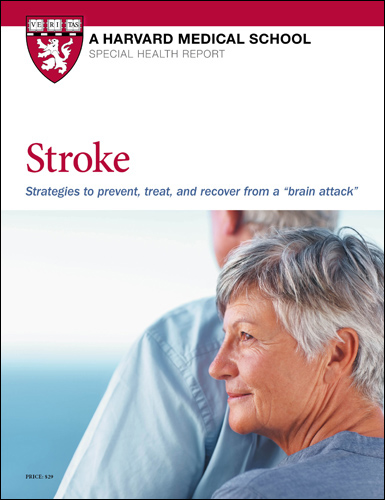Stroke: Know when to act, and act quickly

Identifying and treating a stroke as quickly as possible can save brain cells, function, and lives. Everyone should know the warning signs of a stroke and when to get help fast.
The warning signs of a stroke can begin anywhere from a few minutes to days before a stroke actually occurs. The National Stroke Association has devised the FAST checklist to help determine whether a person is having a stroke.
|
Act FAST If the answer to any of the questions below is yes, there's a high probability that the person is having a stroke. Face: Ask the person to smile. Does one side of the face droop? Arms: Ask the person to raise both arms. Does one arm drift downward? Speech: Ask the person to repeat a simple sentence. Are the words slurred? Does he or she fail to repeat the sentence correctly? Time: If the answer to any of these questions is yes, time is important! Call 911 or get to the hospital fast. Brain cells are dying. |
When stroke symptoms occur, quick action is vital. If you think you or someone with you is having a stroke, call 911. Ideally, the person affected should be taken to a hospital emergency room that has expertise and experience in treating stroke as it occurs (called acute stroke). If you or someone you love is at high risk for having a stroke, you should know the name and location of the nearest hospital that specializes in treating acute stroke. Ask your doctor for help in finding out which facilities fit that bill.
The goal of stroke treatment is to restore blood circulation before brain tissue dies. To prevent brain cell death that is significant enough to cause disability, treatment is most effective if it starts within 60 minutes of the onset of symptoms. But it can still be very effective if given within 3 hours of symptom onset.
An important goal of ongoing stroke research is to find treatments that can buy time by protecting the person's brain until blood circulation is restored, which can increase the chances of survival and decrease the chances of disability.
For more information on ways to prevent and treat strokes, buy Stroke: Diagnosing, treating, and recovering from a "brain attack, a Special Health Report from Harvard Medical School.
Image: © Zerbor | Dreamstime.com
Disclaimer:
As a service to our readers, Harvard Health Publishing provides access to our library of archived content. Please note the date of last review or update on all articles.
No content on this site, regardless of date, should ever be used as a substitute for direct medical advice from your doctor or other qualified clinician.
















